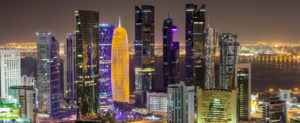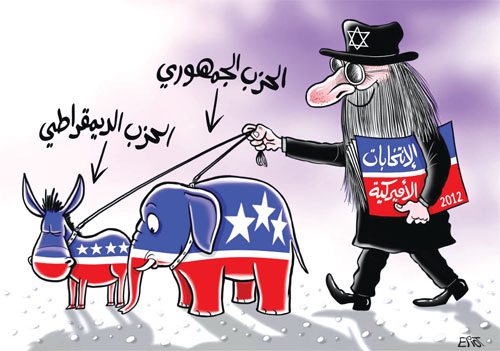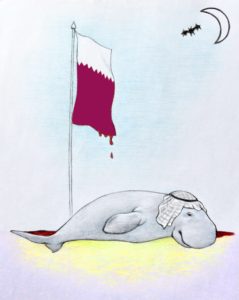Kooky Qatar — More dough than you can sheikh a stick at, Part 2 of 2

Minorities have no chance to become refugees in the Gulf Arab states since they have scapegoated sectarianism from the start. With Druze you lose and what about that Alawite privilege? Christians and Yazidis have had their skin in the game from the beginning, and if a Tunisian report is to be believed, have had some of it forcibly removed. For the BBC, presenting views that express concern for Arab security, identity and social harmony when the same but proportionately greater threats of terrorism and non-integration exist for Europeans beset by the immigration nightmare, must be their idea of “speaking peace unto nation.”
Qatar however reserves refuge for very special individuals, like last year’s break-out hoaxer, “Islamophobia clock boy” Ahmed Mohamed, whose bomb-looking clock in a suitcase provoked a reaction by authorities deemed racist and Islamophobic. Ahmed was uncooperative and passive-aggressive with police investigations, likely instructions provided by his Muslim activist father, who has previously been part of a media circus set up with Florida reverend Terry Jones of “Quran on trial” fame. Still, Ahmed became the improvised martyr for President Obama, Mark Zuckerberg, Harvard and even NASA — perhaps envisaging a career in ballistics.
Striving for social justice in America appears not to have meant much to Ahmed’s family, who promptly pulled up stakes in Irving (Texas) and left for Doha in an undisclosed arrangement. However, the Texan predilection for everything bigger seems to have rubbed off on the Mohameds, as they are suing the school and city of Irving for $15 million.
Qatar is indeed a strange choice of refuge for those trumpeting civil liberties and democracy. Besides being an hereditary regime that bans the formation of political parties and labor unions, it is socially ultra-conservative and very intolerant. The government-owned internet provider Ooredoo censors websites, chat rooms and e-mail for offending content.
Construction of the country’s first Christian place of worship was only allowed in 2008 — with stipulations of no external crucifixes or steeple, and needing security patrols for months after opening. Non-Abrahamic religions are not even recognized by the state. Islam is the religion of privilege in Qatar and should one find oneself on the wrong side of the law, felons can earn a sentence reduction of a few months by memorizing the Quran. Polygamy is lawful, spousal rape is considered a legal absurdity and a woman’s testimony is worth half that of a man’s.
Racism is said to be clear in Qatari society, having its basis in the large numbers of single male laborers from South Asia. The government has managed to exclude them from malls and bazaars one day a week by officiating so-called “family days.” One American exchange student was troubled by the racism he experienced — not as a victim but as a beneficiary of his White privilege. Colorism and racism in non-White countries has long been a taboo subject at the progressive roundtable and not even religious intolerance can be the redeeming scapegoat since in Qatar the Muslim Bangladeshis are treated just as badly as the Hindu Nepalese and Indians.
With this record of oppression, one could expect legions of SJWs to protest any Qatari official setting foot on an American campus, but to the delight of the ruling Emir visiting Georgetown University, he received nothing less than a rousing ovation. Corporate media’s 60 Minutes attempted an investigative piece on Qatar, but its end product felt more like a video postcard. Such favorable treatment is the result of a sea change in foreign relations. Washington once called al-Jazeera “evil” and “extremist,” whereas its current pro-American bias earns it accolades from the political class. When former director general Waddah Khanfar was exposed by WikiLeaks to be liaising with the CIA to the point where content went through an approval process, he resigned immediately.
In some ways media in Qatar has less oversight and politically correctness than its Western establishment counterpart. For many years al-Jazeera Arabic has given a platform to Yusuf al-Qaradawi, the Pat Robertson of the Islamic world, whose weekly program “Sharia and Life” reaches 60 million people. The eccentric 89-year old is linked with the Muslim Brotherhood and applies Islamocentric fervor to almost any aspect of social and political life, even arguing that the Arab world should drop its adherence to the Greenwich Meridian Time (GMT) system and resort to “Mecca time.” He’s also given controversial statements on Jews and the state of Israel, which appear to resonate with the Qatari mainstream.
The Anti-Defamation League, America’s premier sociopolitical Sanhedrin now presided over by neo-Nasi Jonathan Greenblatt, fastidiously catalogs hundreds of “anti-Semitic” cartoons in a database that derives most of its material from the mainstream newspapers of Semitic countries. The most admissions, way ahead of Iran or Palestine, come from Qatari newspapers — all four of them regularly contributing to this special genre of political caricature that seldom requires knowledge of Arabic to appreciate. Recently Greenblatt has been especially focused on the “worrisome” cavalier of Donald Trump, telling Israeli television’s Channel 1 and CNN that Trump has not been apologetic enough over David Duke-endorsement-Gate.

From the newspaper al-Watan (Qatar), January 11, 2012.
Qatar’s wealth and political system afford the country a special kind of stability and insulation from the corrosive effects of hostile external forces, lobbying groups and cosmopolitanism on social cohesion and mercantile integrity. Some marvel at the extent to which Qatar has maintained its very conservative culture and customs in the milieu of excessive consumerism and pervasive globalism. The keffiyeh and white robes remain the choice of dress and it is not uncommon to see male acquaintances still graze noses when greeting as per the custom.
Censors do not have a difficult job in Qatar since almost everything ambiguous falls into the Puritan-era safety net. One private school recently banned an edition of Snow White and the Seven Dwarfs after claims its illustrations contained sexual innuendo — a reference to images of the protagonist being awoken with the kiss of a prince. Similarly, the Ministry of Economy and Commerce forced stores to remove bottles of perfume with the Playboy bunny logo or suggestive titles like “Victoria’s Secret Fantasies: Strawberry & Champagne.” Curiously, these directives originate not with the regime but in response to complaints from the public.
The danger of opulence eroding Arab culture and traditional values has perhaps been an overestimated threat. Social and political observers may well have reason to lament this resilience, since affluence has brought certain problems and not as much of the high-class civility typically enjoyed by countries of the first world. The wealthy Emirates jurisdiction of Sharjah continues to be plagued by millionaire shoplifters, which the police chief has put down to a naturally high rate of kleptomania in the population. When speed cameras were introduced to the region, rather than simply slow down, in some areas drivers drove around them at high speed since curbless desert roads make this an option. Amateur horse races lasting 100 miles in searing desert heat continue to be popular, with no real regulations overseeing the keeping of horses and other big game animals.
Qatar has been dubbed the fattest nation on Earth, to which the popular reaction has been a normalizing of lap-band surgery. One teenager told media, “we just sit, smoke and eat junk food. […] Everything is done for us.” The national animal of Qatar is the Arabian oryx, though recent trends suggest a kindred spirit in the endemic dugong, whose sluggish but very large population is supported by copious meadows of sea grasses. Unsurprisingly Qatari youth rank near the bottom of the global PISA testing of 65 countries.

Arab culture despises weakness, but this usually relates to emotional feebleness or financial inferiority. Aggression is seen as healthy and even treachery earns some respect. In 1995 prince Hamad al-Thani deposed the Qatari emir in a bloodless coup d’état organized while the ruler was holidaying in Switzerland. This was no minor plunge of personal ambition, since the incumbent emir was also his father. The ousted leader reportedly disowned his son at the time, but must have felt some level of pride at his offspring’s bold underhandedness since he returned to Qatar from exile within the decade. As the Bedouin-Arab mantra goes: “I against my brother; my brother and I against my cousin; my cousin and I against a stranger.”
This delicate balance of loyalty has its advantages for those who get into trouble abroad. Qatari prince Hamid al-Thani lived for ten years in the Czech Republic, allegedly for work reasons, and was found guilty of sexually abusing 16 young girls, four of whom were under the age of 15. Thanks to lobbying from the Qatari government and interference from the Czech justice minister, the prosecutor extradited al-Thani in order to “face justice” in Qatar, even though the two states have no extradition treaty and the crimes were committed in Czechland. Upon landing back on home sand, al-Thani was promptly arrested and released two days later with all charges dropped. He later attempted to sue the Czech government for unlawful imprisonment, the claim being 225,000 koruna ($12,000) from a prince in a billion dollar emirate. In Qatar the penalty for sex with persons younger than 16 is life imprisonment, but it’s apparently not a crime if the victims are European.
Rather than reprimand the misdemeanors of blue-blooded child molesters in kuffar lands, the judiciary of Qatar prioritizes the prosecution of such villains as the Qatari poet who was handed a life sentence in 2011 for reciting a poem that wished for change to countries with hereditary rule. The subtle reference was considered an incitement to overthrow the government of Qatar, even though parliamentarian democracy is mandated in the country’s constitution. Moreover, the poet was a student in Cairo at the time. The sentence was later commuted to 15 years before recently being granted a presidential pardon, thanks to the intercession of a leader from the poet’s tribe.
Going abroad to escape national obligations is normally a fairly successful practice. Qatar and Saudi Arabia, who are the self-assuming guardians of social conservatism in a neighborhood of some “un-Islamic” upstarts, nevertheless experience some of its citizens taking kindly to Dubai — the Middle East Las Vegas — or Bahrain, where the weather is always cloudy (an Arab apothegm meaning Allah can’t see what is happening below). Even the Sultan and Prime Minister Qaboos is widely known to be a homosexual, and has ruled since 1970 making for a bad Oman. Moral absolutism among Arabs is a myth and it’s destinations like these that Arabs use at convenience to leave behind God’s law at the border and alleviate repressed tensions. Even the hay’ah (religious police) are known to cross the King Fahd Causeway, partake in depraved benders, and once they are done Bahrain-washing, they return home to psychologically intimidate and chasten the public for every minor transgression.
Deep rooted insecurities are in part what seem to anchor Qatar’s incredible commercial and diplomatic hyperactivity. The small, pubescent state has a weak identity and was a British dependency mere decades ago. Citizens are outnumbered six to one in their own country and are the privileged, less productive segment of the population.
The regime’s Qatharsis, therefore, takes the form of extravagant spending and political attention seeking. Most of its skyscrapers are empty, built in anticipation of the boom and because they look sophisticated. It spends a lot of money on lobbying and P.R., so that think tanks like the Swiss-based Golden Visa can proclaim Qatar to somehow be the second safest country in the world. Even Qatar’s regalia screams look-at-me, with its bombastic  stretch limousine flag that is officially blood-colored and serrated.
stretch limousine flag that is officially blood-colored and serrated.
The ruling elite remains in rather comfortable denial about fundamental aspects of its political acumen and legitimacy. It even re-defines democracy to mean having “the best health care system and the best education system.” In response to damaging claims of large bribes being paid to secure Qatar as the venue for the World Cup, the former Prime Minister explained that they were the result of racism, Islamophobia and bias against Arabs.
Discerning where Qatari identity ends and Arab identity begins is a bit like delineating where the Gulf’s sandy beaches become the desert dunes. The formation of an organic national identity was always going to be disadvantaged since the minority-citizenry shares a lot in common other peoples of the region. Qatar’s religion, language and ancestry are shared with its sole land neighbor, although one certainly cannot box Qatar in with the plane-hijacking Saudis. Pan-Arabism is however used strategically to broaden Qatar’s influence and significance. Al-Jazeera now claims its name (“the peninsula”) is a reference to the Arabian peninsula rather than Qatar. Even the successful World Cup bid was sold on the idea that it is a proxy event for the entire Arab world, although Qatar apparently wasn’t interested in a joint bid.
For all the billions spent on every form of P.R. and advertising, Qatar has become a brand as much as it has become a country. Everyone has the potential to represent it, as evidence by Qatar’s silver-medal-winning team at the 2015 World Handball Championships in Qatar, which employed a swathe of European professionals to represent them — more than three quarters of the squad. The sports federation didn’t stop with the athletes. An entire supporters’ group was flown in from the rowdiest handball town in Spain to cheer for the Qatari team, all expenses paid and with enough money left over to bribe the referees. The Qataris prefer hollow victories over hollow trophy cabinets, but just as disgraceful is the checkbook patriotism coming from Europe.
Europeans have reason to be envious of the trans-national political apparatus that proudly pursues Arab interests and celebrates Arab identity. There is a strong racial component in Arab solidarity although organizations such as the Arab League officially designate a linguistic founding. Tellingly, “the Arab world” is translated in Arabic synonymously with “the Arab nation.”
From a Western perspective, wealthy Gulf states like Qatar will continue to enjoy an exceptionalism accrued through their long-term peace and prosperity in a hostile region. Being a dictatorship-welfare state has its diplomatic pitfalls, but at any rate the politically correct mainstream holds these people and their countries to lower expectations. It’s enough for a Westerner to see the horizon punctured by silver-tiled highrises rather than minarets. Qataris are not among the throngs of refugees answering Merkel’s asylum adhan and so have a certain esoteric innocence. If the media can barely be trusted to explain the difference between a Bibi, Sisi and ISIS, then only censorship can greet the migrant agenda or pipeline wars of the great slick road to the East. Cynical commentators on the black fountain of Arab wealth long for the oil reserves to dry, but the West may not last to see it. Qatar has secured 620,000 acres of prime Australian farmland[i] and owns 10% of the London Stock Exchange, while the Porsches that they drive and share company ownership of are leaving a camouflaging dust cloud in their wake. The State of Steady Habits it is not.
[i] Cranston, M. (2012, May 7). Hassad fills its portfolio. Australian Financial Review, p. 48.





Comments are closed.